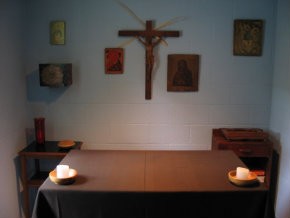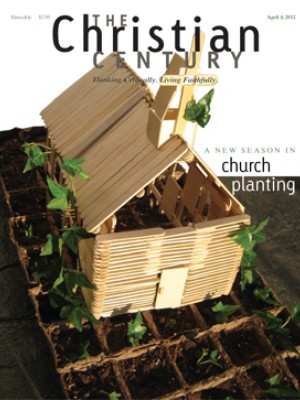Monkish ways

When I was growing up in the 1970s, I loved hanging around the college where my dad taught in the department of religion. My ballet teacher lived at the edge of the campus, and sometimes, after my lesson, I would walk over and find my dad and his students sitting together around a seminar table in the late afternoon light. We called them the monks of Atlantic Christian College—MOACC, for short. By the time I slipped into the classroom where they gathered a couple of times a week, they had already sung the Divine Office and were deep into what they called "Chapter." They might be discussing a book—Thomas Merton's New Seeds of Contemplation is the one I remember best—or dealing with the business of the Order.
The Abbey of Gethsemani had supplied MOACC with psalters marked for chanting. Bound in plastic rings and covered with the kind of cheerful contact paper we used to line our kitchen shelves, these psalters were the heart of the monks' prayer. One of the Gethsemani monks had taught my dad and his students to chant during one of their visits to the monastery. The sound of it was beautiful—gravity and sweetness combined.
Read our latest issue or browse back issues.
When my father was a graduate student at Vanderbilt Divinity School, his teacher Bard Thompson took his students to Gethsemani. In those days there were 250 monks in the abbey, singing the offices in Latin. My dad had never heard anything like the cantor's "In nomine Patris, et Filii, et Spiritus Sancti" ricocheting off church walls, and it entered him in some permanent way. So did the conversations that Thompson arranged for his students to have with Merton. Those encounters with a monk who believed that the wisdom of monastic practice had something to offer everyone led my father, as a professor, to fill his own car with students and drive 12 hours from eastern North Carolina to the monastery in Kentucky.
Each year MOACC elected an abbot, a prior and a novice master, who taught the new members and prayed for them. And they developed a rule, a simple set of guidelines for shaping the life of each monk and the life of the order through prayer. "Inspired by the holy example of Christian monks," it began, "we use this rule to seek a deeper knowledge of God." In four mimeographed pages, the rule offered these college students and their teacher a simple guide to prayer, a way of understanding academic work as part of their spiritual formation, and a vision of human beings as searching creatures, in need of community and care.
The "monks" of ACC were my first loves, the ones I wrote about in my diary at night before I locked it with a tiny key. They were the camp counselors who sat in a circle with us kids on hot summer afternoons and taught us to meditate in silence, the ones who quietly played the opening bars of "Stairway to Heaven" on their guitars as we shared bread and grape juice outside in the mosquitoey night. They were the extra brothers and sisters who appeared at our family's dinner table or in our backyard, joking and flirting. They were the theologians sitting on the floor of our living room, discussing the most compelling questions I could imagine as my sister and I listened from the doorway. They were the college kids I bragged about to my friends.
Today the "monks" of ACC are retreat leaders and pastors, teachers and artists and musicians. Many of them still pack up their guitars and go to camp every summer, sleeping in cabins, making music and inviting teenagers into some of the most ancient practices of Christian life. I think of these teenagers with envy, wishing my days of sitting in the company of ACC "monks" hadn't passed so quickly. Mostly I think of them with joy, imagining what they have received and what they might hand on to others.
Whenever I am lucky enough to encounter these people teaching or leading a new song, I always hear in them an echo of the "monks" they were in college. I hear the curiosity and the desire that led them to try on aspects of the monastic vocation. I hear the receptivity to others that their rule called for and the reverence for the art of living that it cultivated. I also hear an echo of those who helped to shape their vocations, some known to them and some whom they never met—the brother who taught them to chant, Bard Thompson, Thomas Merton, the religion professor who passed on to them his love for monasticism, and the monks whose prayer in an unfamiliar language took hold of their future teacher when he was still a student himself. Surely this is one of the greatest gifts of God to us: that through what we love and what we share, we reach one another in knowable and unknowable ways.







